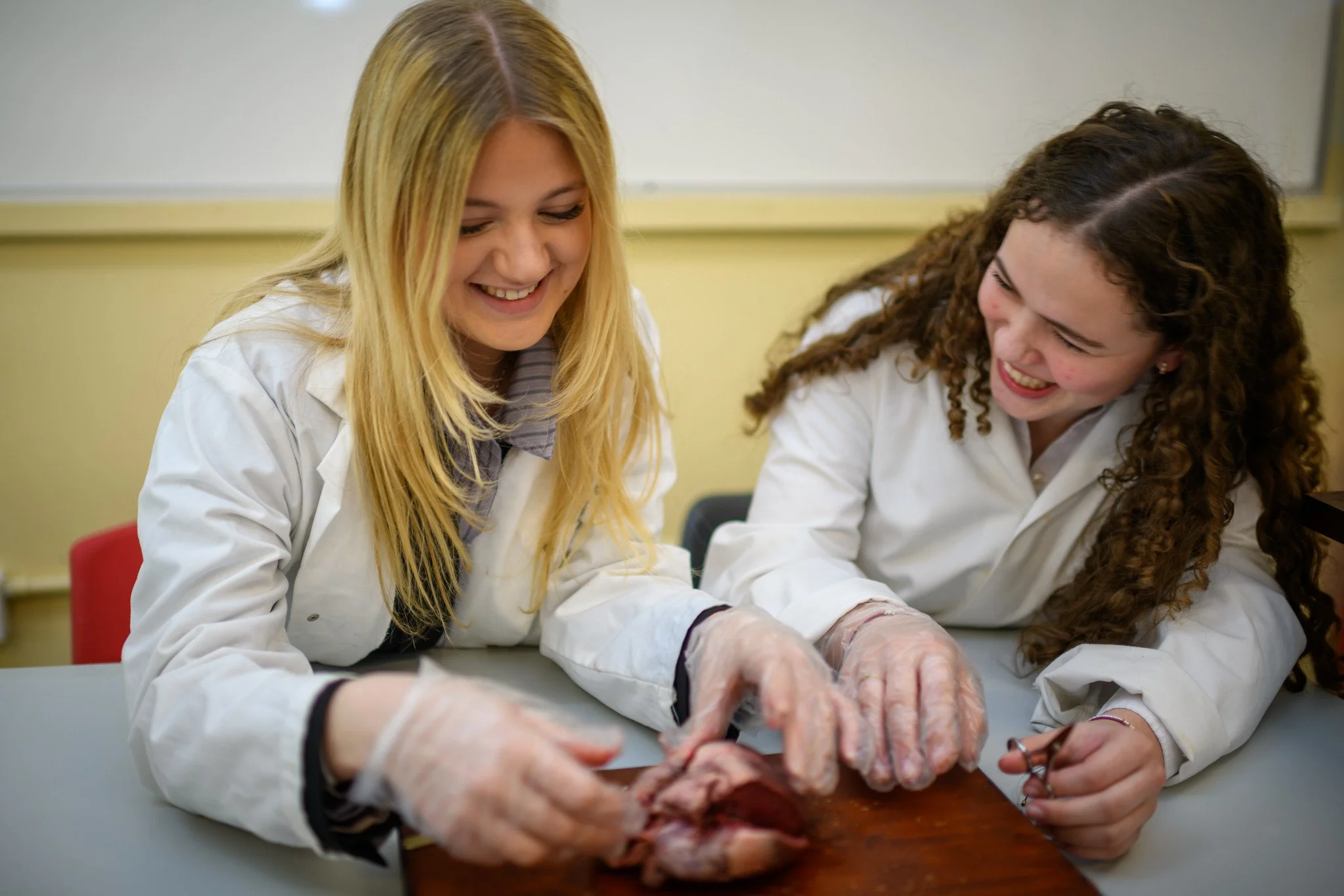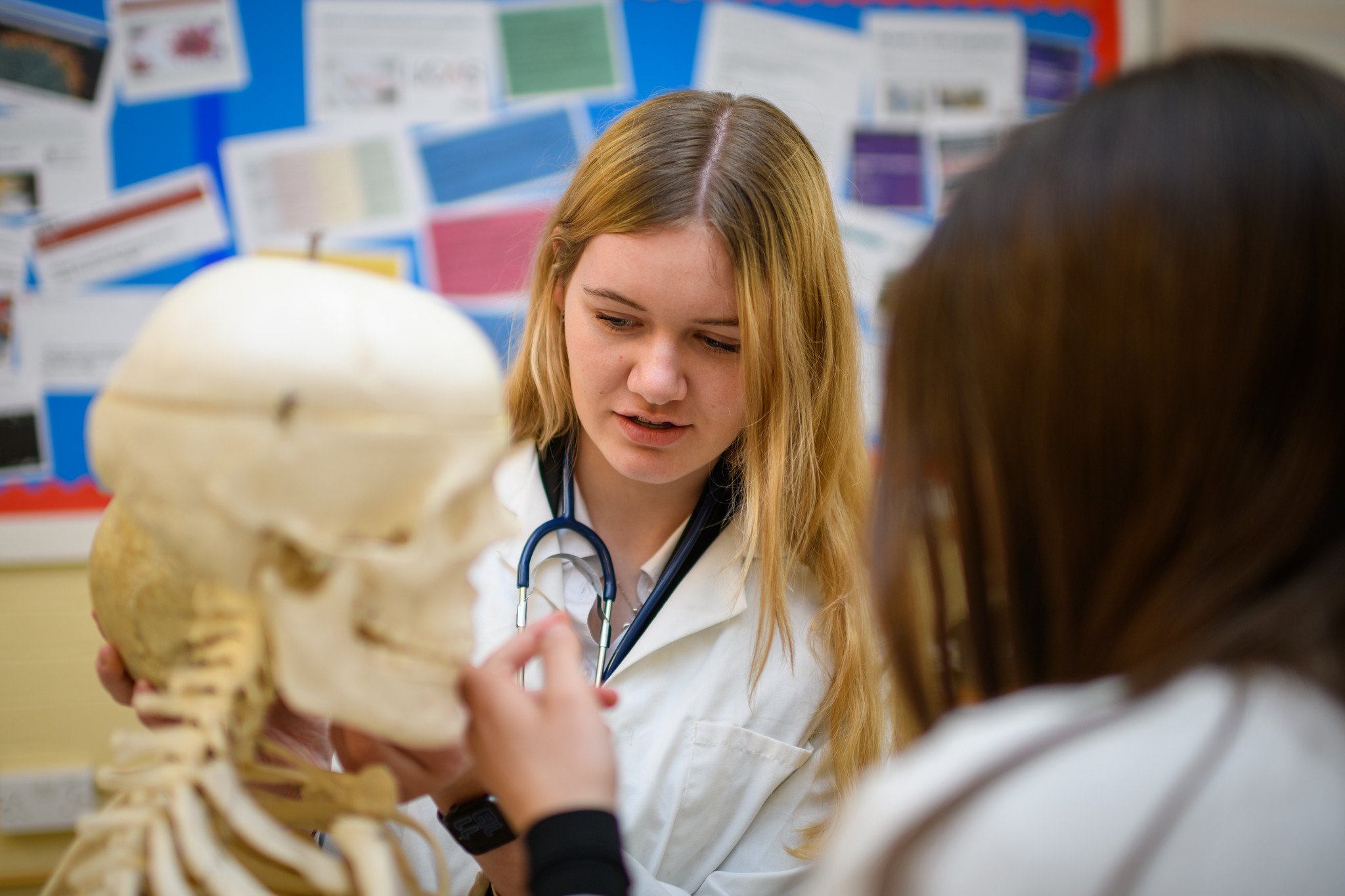
medstream
Medstream is a bespoke programme unique to Rossall, which provides personalised support to students who aspire to a career in medicine, veterinary medicine, dentistry or associated pathways.
-
![]()
Benefits of joining medstream
Learn about medicine: Stay current on the latest medical news and developments.
Make connections: Meet other students and professionals in the field.
Develop skills: Participate in activities like debates, dissections, and lectures.
Get involved: Help organize events and trips to healthcare providers.
Stand out: Demonstrate your interest and initiative in healthcare.
1:1 Support: Personalised advice to make your university application a success.
-
![]()
table of modules
Rossall’s unique Medstream Program consists of six interwoven modules, covered in timetabled slots during the Sixth Form:
Module 1: UCAT Preparation
Module 2: Premed Anatomy and Case Studies
Module 3: Medical Ethics
Module 4: Medical Current Affairs
Module 5: University Applications and Interviews
Module 6: Work Experience
Medstream MODULES
-
![]()
MODULE 1 - UCAT PREPARATION
The University Clinical Aptitude Test is required for entry into many Medical and Dentistry degrees in the UK. The test will comprise of three cognitive ability subtests (Verbal Reasoning, Decision Making and Quantitative Reasoning) alongside the Situational Judgement Test.
The test must be taken between 13th May and 19th September of the students application year at a Pearson VUE Test Centre. The result is issued on the day of the test, and delivered directly to the students chosen universities.
When should applicants start preparing for it?
Drawing from experience and advice from successful candidates, we recommend students start their preparation from the beginning of Year 12. Regular, weekly practice of each question type, leading to the completion of several mock examinations is the key to attaining a high score
-
![]()
Module 2 - Premed Anatomy and Medical Case Studies
Premed Anatomy
These sessions are built to match and support both A-Level and IB Biology physiology topics, giving students the opportunity to learn hands-on how the body works. Example sessions include dissections of the heart and major blood vessels, respiratory system, eye and brain. Comparative anatomy between humans and major groups of domesticated animals will be discussed. There will also be the opportunity to examine tissue specimens under the microscope to further students' understanding of how each organ functions.
Medical Case Studies
Linked to our Premed Anatomy sessions, students will apply their knowledge to investigate a series of medical case studies, giving them a deeper understanding of disease processes within the body. These sessions will begin with a deep dive into the world of pathology, histopathology and forensics, including how post mortem can be used as a tool to establish the cause of death. Following on from this, these discussion based activities will introduce students to the steps in the diagnostic process, evaluating evidence and establishing a diagnosis and suggested treatment plan or cause of death. Example cases include rotenone poisoning, obesity and HIV-AIDS. There will be links to TOK highlighted for IB Biology students.
-
![]()
MODULE 3 - MEDICAL ETHICS
What are medical ethics?
Medical ethics refers to the moral principles that guide healthcare professionals in their decision-making, focusing on respecting patient autonomy, doing good, avoiding harm, and ensuring fairness, essentially outlining the ethical obligations healthcare providers have towards their patients to ensure their well-being and fundamental human rights.
Hippocratic Oath
Students will gain an understanding of what the Hippocratic Oath includes, and how it has changed over time.
NHS Values
There are six values of the NHS Constitution that all NHS staff are expected to demonstrate in their everyday work. It is important that medical applicants think about how they can demonstrate these values in both their university application and interviews. Students will review these values and receive individualised support to help them highlight how they are able to evidence these values on their university ‘brag sheet’, personal statement and during interview preparation.
Ethical Case Studies
We will begin by describing medical ethics and discussing its importance in the practise of medicine. There will be focused sessions to discuss ethical decision making, the patient-physician relationship, start and end of life issues, and medical research involving human subjects.
-
![]()
Module 4 - Medical Current Affairs
A frequently asked type of medical, veterinary or dental interview question is ‘hot topic’ questions about medical current affairs. In these, the applicant may be asked to talk about something which they think is an essential contemporary medical issue - or they may be given one and asked to provide their thoughts. Either way, it’s important that applicants understand some of the most frequently discussed topics and current medical issues affecting their year of application.
During this module students will be provided with further reading tips and links to help them begin their research into their own areas of interest. The aim is to read a broad range of medical topics (recorded in the students own portfolio) and conduct detailed research into one or two of them which they can then present to the rest of the class.
Example recommended reading for 2025 includes Junior Doctor Contracts, Euthanisia and Assisted Dying, and the Mental Health Crisis.
-
![]()
Module 5 - University Applications and Interviews
Choosing Your University
There are a range of pathways to becoming a doctor, dentist or vet. The most common route is to apply for a 5- or 6-year course at university, to begin straight after sixth form.
University Application Process
The Rossall University Applications Process begins in November of Year 12, with an initial meeting for potential early applicants (medicine, veterinary medicine, dentistry) to explain the different approaches needed for these types of applications. All Medstream applicants will receive personalised 1:1 mentoring to draft their UCAS personal statement by the end of the academic year. Final edits to this draft will be made at the beginning of Year 13, to submit the applications by the UCAS early applicant deadline of 15th October.
University Interviews
Medical, veterinary and dental interviews can be unpredictable and challenging. Preparation is key for applicants to feel ready for anything that they may throw at them. The interviewers are looking for confident, enthusiastic candidates, who can clearly communicate their thought process, demonstrate critical thinking, apply their knowledge and solve problems. To gain confidence in this process, Rossall students will complete practice interviews of both styles in June of Year 12 and November/December of Year 13.
-
![]()
Module 6 - Work Experience
Gathering relevant work experience from organisations outside of the school setting for their university application is as important as excelling academically.
The majority of applicants have outstanding academic results, so a work experience portfolio is a great way to stand out. For medicine and dentistry candidates this could include spending time shadowing practitioners at a local hospital, dentist or GP surgery, or volunteering at a hospice, nursing home or children's youth centre.
Work experience is particularly important for students applying to veterinary medicine, with each university outlining their specific requirements on their website. Some require a certain number of weeks spent in various settings, such as small animal practices, large animal practices, and non-clinical animal work e.g. animal shelters and rescue centres, zoos, farms and abattoirs.
Rossall’s Medstream program will provide advice to students on the right approach to find placements that match their interests and goals.








